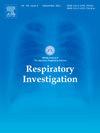Long-term safety and effectiveness of dupilumab in patients with severe asthma: data from post-marketing surveillance in Japan
IF 2.4
Q2 RESPIRATORY SYSTEM
引用次数: 0
Abstract
Background
In Japan, dupilumab, an anti-interleukin-4Rα monoclonal antibody, is approved and recommended as add-on therapy for patients with moderate-to-severe asthma uncontrolled with conventional therapies. This post-marketing surveillance (PMS) aimed to evaluate the long-term safety and clinical effectiveness of dupilumab in Japanese patients with moderate-to-severe asthma.
Methods
Patients who initiated dupilumab for moderate-to-severe asthma between June 2019 and July 2021 were included. Safety and effectiveness outcomes were monitored for 1 year following dupilumab initiation or until treatment discontinuation. Safety was assessed by evaluating the incidence and severity of adverse drug reactions (ADRs). Effectiveness was assessed through the incidence and frequency of severe asthma exacerbations.
Results
Overall, 390 patients were registered from 129 clinical sites in Japan. In the safety analysis population (N = 376), ADRs were reported in 37 patients (9.8 %), including five (1.3 %) with serious ADRs. When stratified by baseline age, ADRs were reported in 22 patients aged <65 years (10.7 %) and in 15 patients aged ≥65 years (8.8 %). In the effectiveness analysis population (n = 373), the frequency of severe asthma exacerbations in the year following dupilumab initiation was significantly lower than the year before treatment (least squares mean [95 % confidence interval] 0.25 [0.20–0.31] vs 1.48 [1.26–1.73] events/year; incidence rate ratio 0.17 [0.14–0.20]; P<0.001). Subgroup analyses found that safety and effectiveness outcomes were similar between patients aged <65 and ≥65 years at baseline.
Conclusion
Consistent with previous clinical trials and real-world studies, this PMS confirmed the long-term safety and effectiveness of dupilumab for patients with moderate-to-severe asthma in Japan.
Clinical trial registration number
UMIN Clinical Trials Registry (UMIN000036992)
dupilumab治疗严重哮喘患者的长期安全性和有效性:来自日本上市后监测的数据
在日本,dupilumab是一种抗白细胞介素- 4r α单克隆抗体,已被批准并推荐用于常规治疗无法控制的中度至重度哮喘患者的附加治疗。该上市后监测(PMS)旨在评估dupilumab在日本中重度哮喘患者中的长期安全性和临床有效性。方法纳入2019年6月至2021年7月期间接受dupilumab治疗中重度哮喘的患者。安全性和有效性结果在dupilumab开始治疗后或直到停止治疗后的1年内进行监测。通过评估药物不良反应(adr)的发生率和严重程度来评估安全性。通过严重哮喘发作的发生率和频率来评估疗效。结果共有来自日本129个临床站点的390例患者注册。在安全性分析人群(N = 376)中,37例(9.8%)患者报告了不良反应,其中5例(1.3%)为严重不良反应。当按基线年龄分层时,22例65岁患者(10.7%)和15例≥65岁患者(8.8%)报告了不良反应。在有效性分析人群(n = 373)中,dupilumab开始治疗后一年的严重哮喘发作频率显著低于治疗前一年(最小二乘平均值[95%置信区间]0.25 [0.20-0.31]vs 1.48[1.26-1.73]事件/年;发病率比0.17 [0.14-0.20];术中,0.001)。亚组分析发现,65岁和≥65岁基线患者的安全性和有效性结果相似。结论:与之前的临床试验和现实世界的研究一致,本PMS证实了dupilumab治疗日本中重度哮喘患者的长期安全性和有效性。临床试验注册号:umin临床试验注册(UMIN000036992)
本文章由计算机程序翻译,如有差异,请以英文原文为准。
求助全文
约1分钟内获得全文
求助全文

 求助内容:
求助内容: 应助结果提醒方式:
应助结果提醒方式:


